Phentermine Dry Mouth: Causes, Duration & Remedies
Medically reviewed by Dr. Marcus Goodman
Phentermine is a widely used weight loss medication that helps suppress appetite and boost energy levels.
However, a common side effect is phentermine dry mouth, or xerostomia, which can cause discomfort and oral health issues. Understanding and managing this side effect is crucial for maintaining overall health and comfort during your weight loss journey.
Does Phentermine Cause Dry Mouth?
Yes, dry mouth is phentermine’s most common side effect (
A recent online poll by Phentermine.com confirmed that many patients experience phentermine dry mouth. In fact, 82% of phentermine users report dry mouth while using the medication, which makes it 30% more common than the next most reported phentermine side effects, insomnia and constipation.
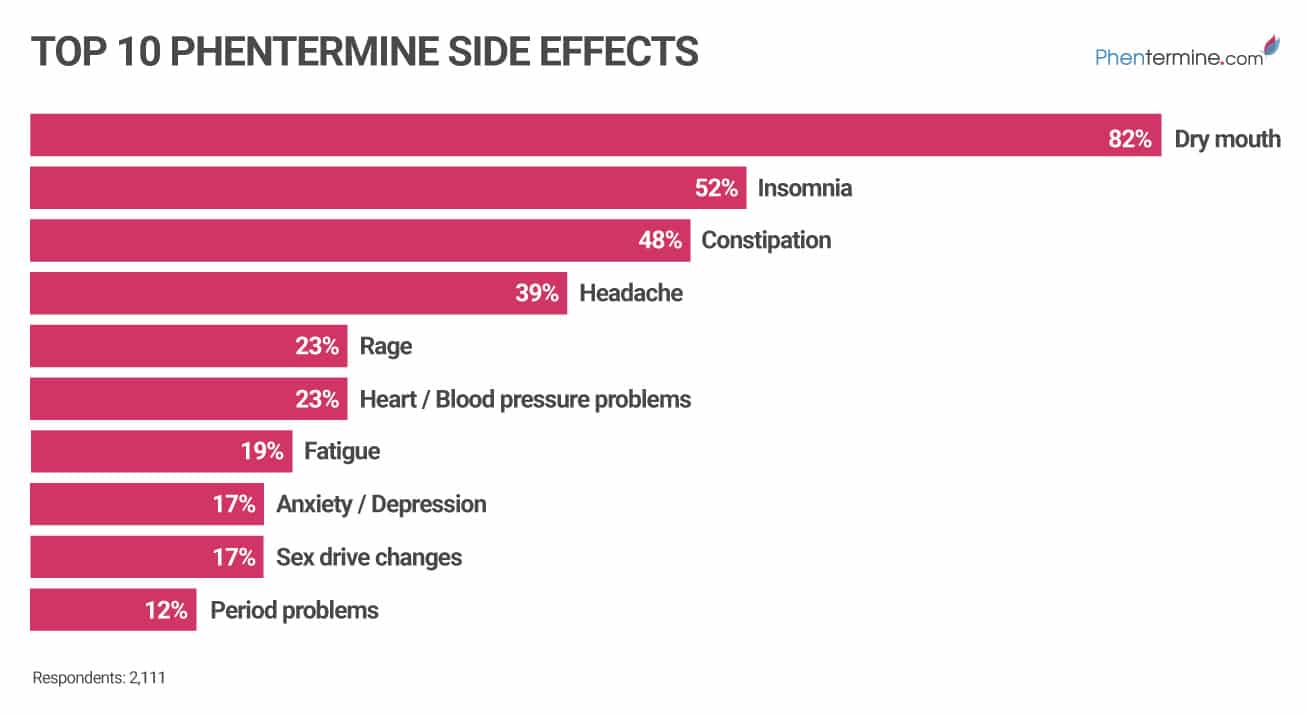
Common Symptoms
Patients often experience persistent dryness in the mouth, lips, and tongue, which can lead to bad breath and a sore throat. The lack of moisture in the mouth provides an ideal environment for bacteria to thrive, contributing to bad breath. Furthermore, the dryness of the surrounding tissues can lead to discomfort and soreness in the throat.
Potential Complications
Dry mouth can increase the risk of oral yeast infections, such as thrush or candidiasis. These infections usually appear as white, clumpy plaques, but can also be red and irritated. While pain or changes in taste are possible, they are rare.
Prolonged dryness can also lead to dental issues, such as cavities and sores. The lack of saliva, which usually helps neutralize acids and wash away food particles, accelerates the development of dental decay and other oral health issues.
Causes of Phentermine Dry Mouth
Phentermine causes dry mouth by increasing the levels of epinephrine and norepinephrine in the body. These neurotransmitters are responsible for the stimulant effects of phentermine, which include increased energy and alertness. However, they also instruct the body to divert resources away from non-critical functions, such as saliva production. This decrease in saliva causes the feeling of dryness in the mouth, lips, and tongue. (
Interestingly, this mechanism is similar to the dry mouth experienced during nervousness or fear. In both cases, the body prioritizes other functions over saliva production, resulting in a dry mouth.
How Do You Treat Phentermine Dry Mouth?
1. Stay Hydrated
It’s essential to stay hydrated to manage phentermine dry mouth. Drinking plenty of water helps moisten your mouth and alleviates the uncomfortable “cotton mouth” feeling. Carry a water bottle with you and take frequent sips throughout the day to ensure you stay hydrated. This not only helps with dry mouth but also supports overall health and weight loss efforts.
2. Chew Sugar-Free Gum or Suck on Sugar-Free Candy
Chewing sugar-free gum or mints can stimulate saliva production, providing temporary relief from dry mouth.
3. Practice Good Oral Hygiene
Maintaining good oral hygiene through regular brushing, flossing, and dental visits is also essential. This helps prevent dental issues that can be worsened by dry mouth, such as cavities and sores. We recommend brushing your teeth at least twice daily and flossing once a day. Don’t forget to brush your tongue gently to remove bacteria.
4. Use Alcohol-Free Mouthwash
Look for mouthwashes containing xylitol or other moisturizing agents; avoid those with alcohol, as it can exacerbate dryness.
5. Avoid Caffeine, Alcohol, and Tobacco
Additionally, it is advisable to avoid caffeinated and sugary drinks, alcohol, and tobacco. All three can dry out your mouth further and worsen your breath. Opt for water or herbal teas to maintain hydration.
6. Eat Foods With High Water Content
Incorporating foods with high water content into your diet can help manage dry mouth. Fruits like watermelon and vegetables such as cucumber are excellent choices. Avoid dry, salty, or sugary foods, such as crackers, chips, and dry bread. Also, be sure to limit spicy foods, as they can aggravate dry mouth and worsen breath.
7. Use a Humidifier at Night
Using a humidifier can add moisture to the air. This is especially helpful if you live in a dry climate or use central heating. Placing a humidifier in your bedroom can help alleviate dry mouth symptoms while you sleep, making it easier to manage this side effect of phentermine.
8. Try Over-the-Counter Remedies
If home remedies are ineffective, consider using over-the-counter saliva substitutes or mouthwashes specifically designed for dry mouth relief, such as Biotene Moisturizing Gel, which can be found at Walmart. These products can offer temporary relief and are a convenient option for managing dry mouth symptoms.
9. Try Oil Pulling
Some patients report that oil pulling can help with oral moisture and odor. Simply swish a tablespoon of coconut or olive oil in your mouth for 10–15 minutes, then spit it out (do not swallow).
10. Rinse With Salt Water
Other users are rinsing their mouth with salt water to deal with phentermine dry mouth. For this, mix 1/2 teaspoon of salt in a glass of warm water, rinse for 30 seconds, and then spit out.
11. Breath Through Your Nose
A remedy that is a little more complicated to apply, yet recommended by patients: Try to breathe through your nose, especially at night. Mouth breathing dries out the mouth.
Patient Stories On How to Deal With Dry Mouth
Hear what helped patients who suffered from phentermine dry mouth. All testimonials are from the Official Phentermine Support Group on Facebook.
I chew watermelon gum or suck on a jolly rancher. doesn’t solve it 100% but it doesn’t make me gaggy like other flavors and helps with the dry mouth enough.
Nancy Maria D.R.
I drink like 7 litres a day normally so for me upping water intake which was already high was a saving grace.
Sacha R.
I brush my teeth. It really helps with my dry mouth.
KAYLAN W.
I put on chapstick and chew gum it helps me.
Sabrina Marie S.
Cherry cough drops. Also dry mouth got better after a few months.
Laureen K.H.
Potassium drops in your water helps. I finally had to accept that when it comes to the side effects, brand name phentermine was actually worth it.
SELAH A.
Mine went away once I started drinking at least 1 gallon per day.
JASON L.
Suckers helped me a lot plus brushing more.
DEE J.
What helped me was pedilyte. Idk why but it did, bc the water wasn’t helping me neither.
Kelly G.
I use Extra polar ice. I’ve found it keeps it’s flavor the longest and I keep drinking water even when I’m chewing it.
JAIME E.
I add a scoop of InfuseHA to my water daily and have noticed a big difference.
NIKKI G.
WATER, GUM, MORE WATER, MORE GUM, WATER AGAIN, LOTS OF ICE, GUM AND WATER AGAIN 😂🤣😂🤣 I’m serious, that’s my life right now.
Amanda M.C.
User-Recommended Over-the-Counter Remedies for Dry Mouth
Patients also recommend the following OTC products for phentermine dry mouth.
Note: We are not affiliated with any of the mentioned companies, nor do we endorse them.
TheraBreath Dry Mouth Lozenges
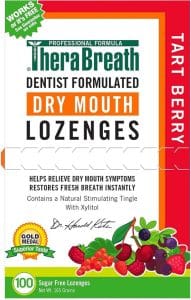
ACT Dry Mouth Mouthwash
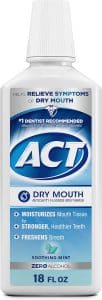
XyliMelts Dry Mouth
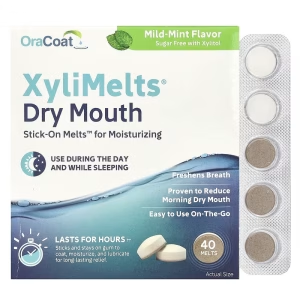
Biotène Moisturizing Gel
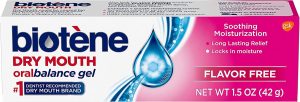
FAQs
How Long Does Dry Mouth from Phentermine Last? Does It Eventually Stop?
The severity of phentermine dry mouth varies from person to person, but most patients report improvement in symptoms after 1-2 weeks of treatment. Others experience it for several months, and in some cases, it persists the entire time they’re on the medication. Staying adequately hydrated can also help alleviate some of the most bothersome symptoms.
When to Worry About Dry Mouth
Prolonged dry mouth can lead to complications like oral yeast infections, dental decay, and bad breath. Regular check-ups with your dentist and doctor can help monitor and manage these symptoms. If dry mouth persists despite at-home remedies, consult a healthcare professional.
Sometimes, your healthcare provider may suggest adjusting your phentermine dosage or recommend over-the-counter remedies, such as saliva substitutes or mouthwashes. Always discuss any changes in your medication regimen with your healthcare provider to ensure safe and effective treatment.
- Cosentino, G., Conrad, A., & Uwaifo, G. (2011). Phentermine and topiramate for the management of obesity: A review. Drug Design, Development and Therapy, 267. doi:10.2147/dddt.s31443
- Miranda-Rius, J., Brunet-Llobet, L., Lahor-Soler, E., & Farré, M. (2015). Salivary Secretory Disorders, Inducing Drugs, and Clinical Management. International Journal of Medical Sciences, 12(10), 811-824. doi:10.7150/ijms.12912

